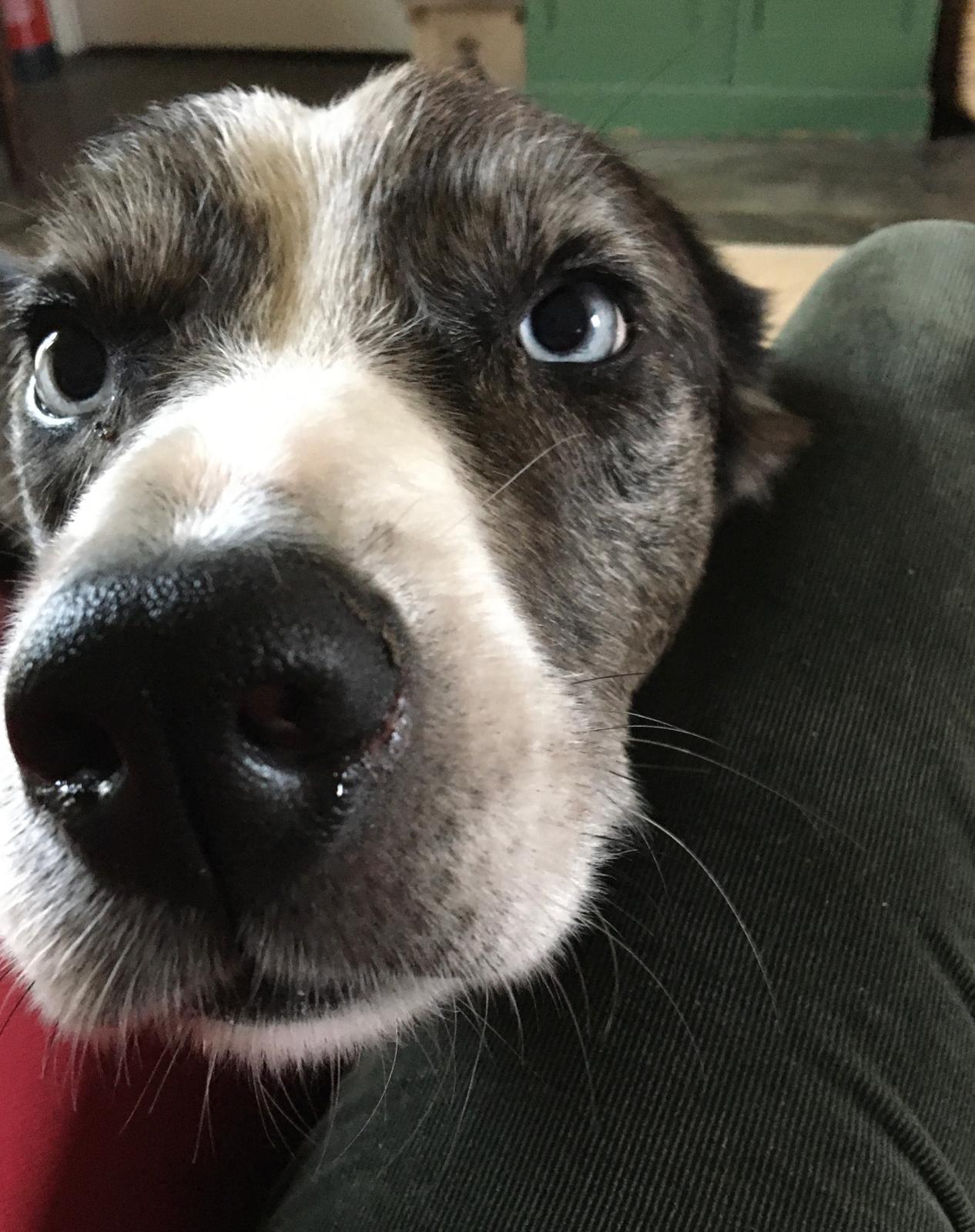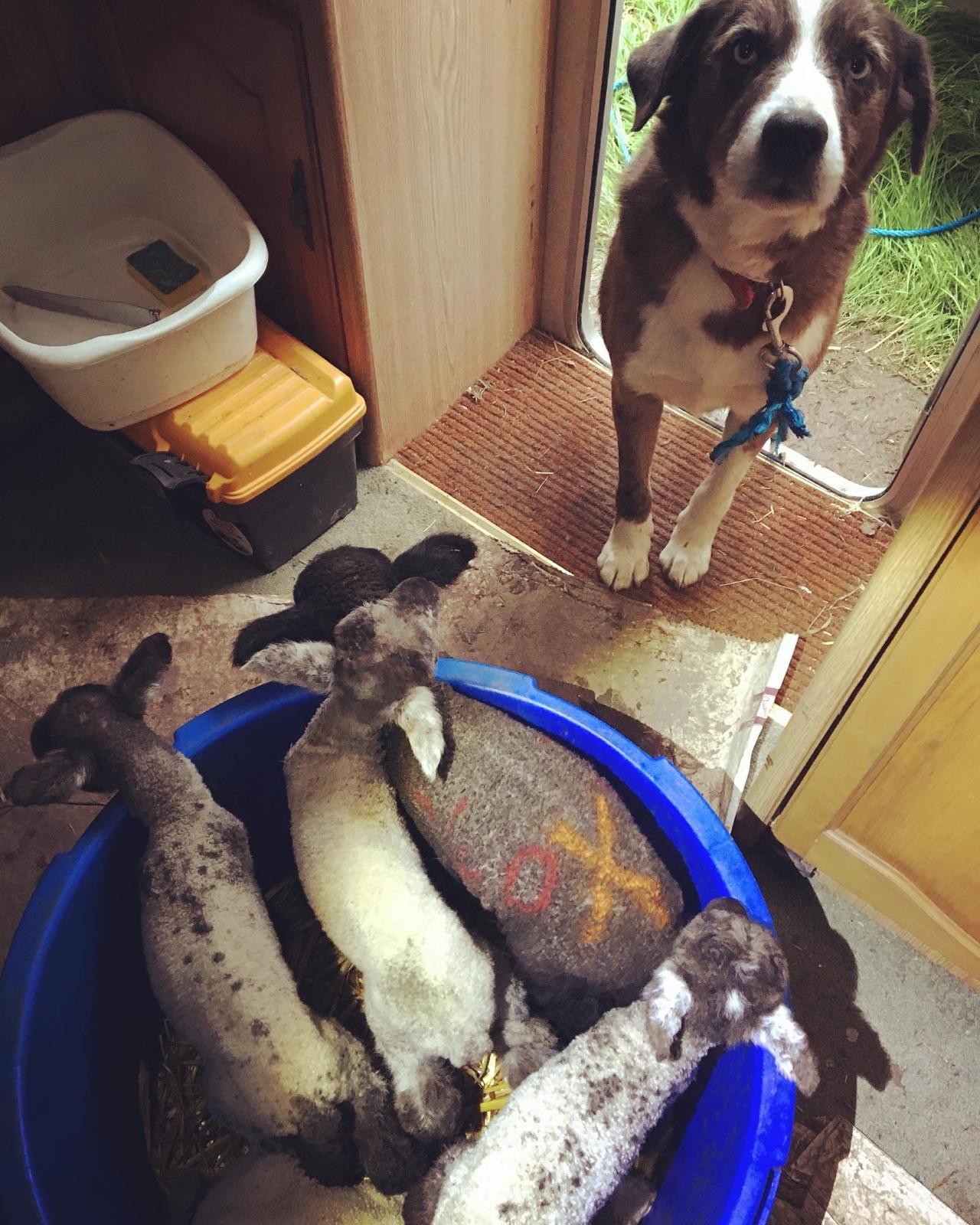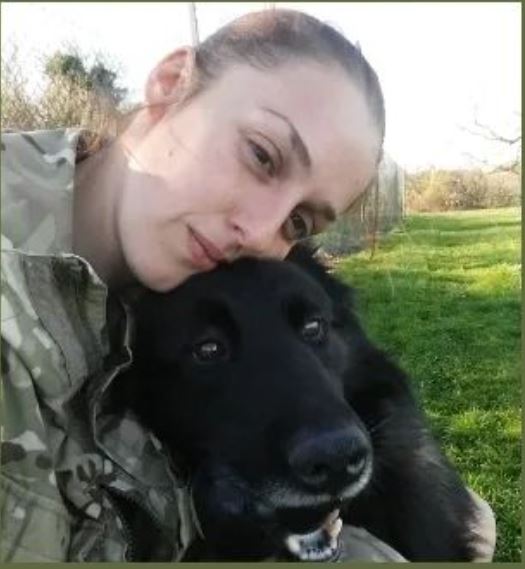Teaching An Old Dog New Tricks - Holistic support for the retiring working dog
- Whole Health Agriculture Learning Centre
- Companion & Working Animals
I have to leave Blue behind now and it breaks his and MY heart!

Blue still wants to go to work with his mum
These words from shepherdess, Kate Scott who is also our medical herbalist reminded us that retiring working dogs demands our attention. The stress of leaving a retired working dog behind because their bones just can't manage a whole day is heart-breaking for everyone. Heart break has homeopathic Ignatia written all over it, and the farmer should be taking it as well as the dog! (Sadly Blue went to his flock over Rainbow Bridge as we typed this blog. Our hearts are with his family.)

The retired Blue still had a job to do
Retiring working dogs (of any sort, including gun dogs) requires some skill to ensure a reduction in stress and to enhance a good retirement for the dog which has given us, most often, years of service. We chatted with a couple of people whom we thought would bring some sound advice, starting with probably the country's leading experts in the successful retiring of military working and sevice dogs, Hero Paws. Hero Paws is a charity which retrains and rehomes unsuitable and retired military, police and other service dogs.
Their 'Dog Boss', Jaime Garner (above with retired special forces dog Fazz) explained, from a military or police point of view "we advise avoiding anything that can cause high arousal." That goes without saying for the dogs trained in attack work. Fortunately, the average farmer does not have to consider this, but it's interesting to consider what activites don't help your dog to kick back and relax. Jaime suggested that forming a routine which includes new environmental opportunities such as new places to visit or health trips to the hydro or physio/canine massage makes them still think it's a work routine but possibly with a side-portion of health benefits. Hero Paws suggests scent work games and maybe classes for those who need a little extra transition help.
When asked specifically about farm dogs, Jaime, an ex-Army dog handler talked about the transition itself, especially when you have the new pup working alongside the retiring dog. This allows a slow adjustment for your retiree, while they eventually switch to watching the pup work. There's no doubt that most old dogs will still want to do some of that work, so just allow an opportunity for them to do something they are physically able to do; watching lambs or sorting out a few rabbits in the hedgerows. While they are still able to be involved, let them have a few jobs to do and make them feel included.
Jaime went on to explain that most working dogs prioritise connection to their human.
For working breeds it's instinctive and natural but it will all come down to the need to please and conform their drive to our needs. As long as the dogs still have an opportunity to have the human connection, the dog transition will come. We just need to adapt their pattern to suit their body's pace.
She reflected that for some dogs stuck in kennels with a high frustration drive, they may take a little longer to realise that relaxing is so much easier than pent up stress. Jaime said,
I'm very much a believer they should be completely 'switched off' on retirement for mental health reasons. They are normally retired from post due to their physical shortcomings, so when the dog's body says 'no', you need to switch their focus to stimulate them mentally rather than physically. Farm dogs are used to making independent decisions whilst away from the handler, so this can be a challenge to replace. Perhaps feeding in small parcels around the barn, hiding them so that your older dog can find them but have to work and make decisions themself. You can replace this with the use of a foraging mat or hiding treats in screwed up paper in cardboard boxes. If you HAVE to leave your working dog, this might occupy them while you quietly leave with the younger dog.
Jaime's final observation was that if a farmer has to leave for several hours at a time, your retired dog will find this very difficult. If it is at all possible to take your old dog along on the quad or in the truck, let them come. You can reward them for guarding the vehicle and give them little opportunities to get out and check fences with you, for instance.
Jaime finds that the Belgian Malinois and German Shepherds soon get the hang of a settee and her policy to let them put paws up and properly retire usually goes well. She recognises that it isn't that simple for the farm dog who sometimes watches their much loved human leave with another dog. This is where some well-chosen homeopathic remedies can come in handy - see the end of the blog for those.

Retired Military Working Dog Stikky demonstrates how easy it is to retire on a comfy chair
A call out to our farmers for their input brought this lovely contribution from The Homeopath Farmer, Pat Aherne.
Max is 7 years old, so still within working age, however, he was totally loyal to Pat's late father and when he passed away, Max just lost interest in being up and around the yard. Pat decribed how Max avoided hs old master's room for six months until he was given some homeopathy.
To get to the other side of the house Max would go out the front door, go around the house to the back door. It was not until I give him Nat Mur that he went into his room.
Pat went on to say that
it took two years to break down my wife who completely refused to have him in the house. Now they are best friends!!
Pat didn't mention the remedy he gave his wife to accomplish that outcome. Either way, you can see from our cover picture that Max has made himself very much at home with the family.
Homeopathy for Canine Grief
We've already mentioned Ignatia; this is possibly the first remedy that our farmers will think of when treating for grief. Any situation where there is loss, a change which causes feelings of grief benefits from regular doses of Ignatia until things settle into a new routine. Alongside Ignatia, a WHAg farmer will immediately consider Pulsatilla. That's for the dog that is needy and gives you 'those eyes' when you leave, you know the one ...
Homeopathy brings a multitude of remedies to treat grief but we'll mention a few extra ones here. There's nothing to be lost trying homeopathy and everything to gain. If it reduces stress in your working dog (and you) then it will reduce the chances of dis-ease aswell.
The chronic remedy to Ignatia is Natrum Mur. This dog will be the hard-working animal who lives for their job. If they are grieving, they'll take themselves away and sulk on their own, looking at you accusingly from their dark corner. If Nat Mur doesn't quite hit the spot, you might look closely at Ambra Grisea. There might be a little doggy dementia stealing in on this picture. They'll stare into space looking miserable and seeming to have lost their love for life.
If you've got a dog who appears to think that they've done something wrong which is why they've been retired, Aurum Met is worth considering. The Aurum patient can be restless alongside being depressed. They'll have a deep air of sadness about them. Aurum is homeopathic gold, so it's nice to think that Aurum brings the sparkle back into the patient's life.
In order to find the right grief remedy it can be helpful to look for some of the physical symptoms your dog is showing. Are they unusually restless or unusually quiet and withdrawn. Do they now prefer to be in the warm by the range or are they happier in the barn? Anything which is unusual for your dog is worth paying attention to, to give you extra guidance on your remedy selection.
A well-earned retirement for Retired Special Forces Dogs Fazz and Marion and Retired Police Dog Fedor
For more on elderly canine behaviour for the retired working dog, look out for our blog featuring vet nurse and canine behaviourist, Morag Sutherland.
Further Information:
Visit the WHAg Learning Centre for a range of webinars and downloadable documents on complementary and alternative health modalities for the farm. You can access a little more if you sign up as a free member and pro members get EVEN more!
Information on the Foundation Course in Pet Homeopathy is here.
Also CAM4animals provides a one-stop-shop for pet and livestock owners seeking more information on all forms of CAM and help with finding appropriate qualified practitioners.

